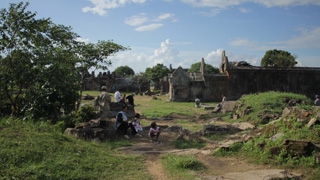Boundary
Fahtum Pandinsoong THAILAND, CAMBODIA, FRANCE / 2013 / Thai, Khmer / Color / Blu-ray / 96 min
THAILAND, CAMBODIA, FRANCE / 2013 / Thai, Khmer / Color / Blu-ray / 96 min
Director, Photography, Editing, Producer: Nontawat Numbenchapol
Assistant Directors, Additional Photography: Nunthapol Ajawakom, Kakrona Chan
Additional Photography: Adunwit Akkarawutmethakorn
Post-production Supervisor: Lee Chatametikool
Post-production Sound and Mix: Nopawat Likitwong
Sound Design: Katenan Juntimathorn
Co-Producers: Donsaron Kovitvanitcha, Davy Chou
Production Company: Mobile Lab
World Sales: Vycky Films
In 2010, the young Thai director Nontawat Numbenchapol met a 24-year-old man from Sisaket Province, which runs along the Cambodian border. He had served as a soldier in southern Thailand, but had been discharged and was on his way back to home. His experiences open a window into the political struggle between the Thaskin faction (the “Red Shirts” based primarily in the countryside) and the anti-Thaskin faction (the “Yellow Shirts” of the city), as well as Thailand’s border dispute with Cambodia and the lives of those who live along the border. Vivid colors and gentle movements create an impactful and unique visual experience, as a young generation’s critical gaze toward their government emerges.
[Director’s Statement] Everything began in 2010, during Thailand’s political crisis. People in Bangkok spoke of the Red Shirts Protests from a specific point of view. I was working on a local film production at the time. While in production, I met Aod, a young man from Sisaket, a northeastern province in Thailand that borders Cambodia and the Preah Vihear Temple. Aod can speak Khmer, and during his military service he was sent to the South to fight the separatists. In 2010, he was dispatched to Bangkok to dissolve the Red Shirts protests. After he was discharged from the army, he went back to his hometown. As I am Bangkokian, I wanted to understand people who live in the actual place where this conflict occurred. That is the reason I followed Aod to his hometown and made this film.
People lived peacefully there before the border conflict, but the conflict reignited during Thailand’s political crisis. There were protests in Bangkok over this issue. I don’t know if the protesters wanted to reclaim the temple, or if they just wanted to attack their political opponents.
A boundary is the imaginary line we mark to separate an area. Boundary disputes can happen anywhere. I believe that people living along the border are the just the same as us. They share the same culture, language and tradition, but due to different political policies and many other reasons, a boundary was created to separate them.
This film was made to express my feeling toward “boundaries”—not just territorial boundaries, but also the boundary between social classes, the boundary between birth and death, and the boundary between joy and sorrow.
 Nontawat Numbenchapol
Nontawat Numbenchapol
Born May 2, 1983, in Bangkok, Thailand. Nontawat Numbenchapol graduated from the Visual Communication Design Department of the Faculty of Fine Arts of Rangsit University. His work is about “space.” His debut first documentary Weirdrosopher World (2005) tells the story of skateboarders who try to find their own space in Thai society. The film was supported by GTH, one of the largest film studios in Thailand, as well as Thunska Pansittivorakul’s Thaiindie Group. Weirdrosopher World screened at the Bangkok Experimental Film Festival and the World Film Festival of Bangkok. Nontawat’s second documentary was Empire of Mind, released in 2009. The film shows his relationship with his grandmother, who raised him since he was very young.
